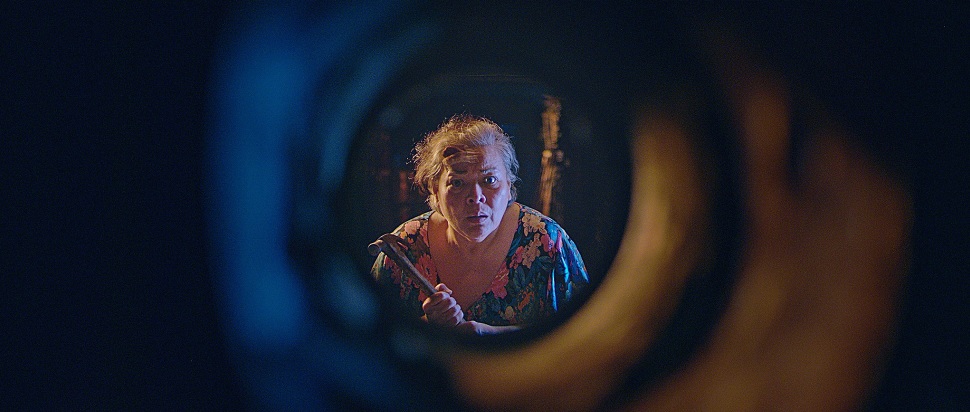Martika Ramirez Escobar on Leonor Will Never Die
In Leonor Will Never Die, a Filipino screenwriter starts to live out her unproduced screenplay – director Martika Ramirez Escobar tells us about her love of action films and her desire to put an older woman in this macho world
“I think my relationship with cinema started from television,” explains Martika Ramirez Escobar, the director of the fantastic and somewhat fantastical Leonor Will Never Die. The film centres on a retired screenwriter who becomes a character in one of her own scripts after she’s struck on the head by a falling TV set. “Of course, I saw more films on the television than in the cinema – it's the most accessible object for us to see other worlds on a screen.” It was via the communal act of gathering in front of the television that Escobar became acquainted with the genre that would eventually be explored, exploded and parodied in her inventive debut feature. “In the Philippines, it's a thing to spend your afternoons with your whole household in front of a TV,” she explains, “watching a replay of an action film. We've seen so many of these, it's ingrained in our minds and souls.”
Leonor Will Never Die follows the ageing Leonor (Sheila Francisco) as she nostalgically watches the violent action spectacles she used to help write – then she's knocked unconscious. While in a coma, she enters the world of her unproduced screenplay Return of the Owl. “One part of the film is an observation of how the Filipinos are obsessed with the action genre,” says Escobar, “Growing up, our president was a former action star; he didn't have a background in law and governance, but he still got elected. Even in our last elections, our leading senator was an action star. So, it's a reflection on that.”
The inspirations that Escobar drew upon when writing and making the film were varied, though. “Another part is an existential crisis: about what to do after college and also this idea of how we write our lives. It's also a collection of traits – or people – I truly loved in life, put together in one film. There's my grandma, my family, my friends, the joy of making a film. In a way, it's quite personal.
“At the very beginning,” Escobar elaborates, “I knew I wanted to make a film about a grandmother. There's something about my grandmother that I couldn't understand: she's the type of person who is just so positive – she sees so much beauty in the world that I find sick and sad. I wanted to try to understand the wisdom coming from a grandmother. Of course, by making an older character, you have to try to just understand that – by doing research, talking to people, talking to my grandma.”
The result of this consideration is evident on-screen. As well as presenting instances of generational tension, the film attempts to present its protagonist's perspective and interior life, particularly through her genre-inflected dream. “I think I changed as a person in the eight years of making this film,” says Escobar. “When I was 21, all I wanted was to make an action star grandma – for the gimmick, for the excitement of seeing a character you don't see often. Through the years, as I grew older, and a bit wiser, I began to wonder: why am I invested in making a film with a grandma as an action star? There came a moment of clarity; I wanted to see how a woman engages with a macho world. Also, I wanted to explore how a woman can solve problems, not through violence, but through love and tenderness and communication.”
Change seems to have been an integral part of the journey of making the film. Where Escobar’s original vision centred on an unlikely heroine, and the thrill of transporting a character to another world, it took on a deeper meaning regarding connection and the ability of art to recreate the world. The film’s final 15 minutes, in which the boundaries between fantasy and reality well and truly break down, were not originally planned at all.
“It came as the result of a crisis,” Escobar recalls. “My editor and I were seated in the editing room, and I'd called picture lock already. We were like, 'Is this it?' Then, my producer called and said we don't have an ending! We were happy with it, so something was clearly wrong. So, I just asked him to record the screen of Adobe Premiere [featuring the film’s editing timeline]. He eventually added it in to the film.
“It became this highlight of the experience,” she explains. “Suddenly eight years of work fits in this tiny timeline on a screen. It really does start to look like a lifeline, with so many cuts, and layers, and people manipulating it as you're living it.” Somehow this accident of happenstance came to encompass much of what the film was exploring. “The timeline of the film is being revised, or rewritten, or remade. So, it's very similar to how we operate as people. I think we all make decisions based on what we think is the next best decision.”
Leonor Will Never Die is released 7 Apr by Conic
For more on Leonor Will Never Die, listen to the latest episode of The Cineskinny podcast on Spotify, Apple Podcasts, or your favourite podcast platform
